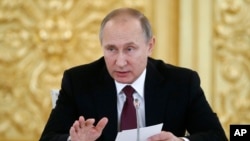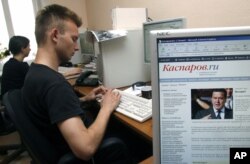Russian President Vladimir Putin has signed off on a new “information security doctrine,” replacing the one he issued in 2000, during the first year of his rule. While experts in Moscow saw no surprises in the new document, they also said it reflects the Kremlin's increasingly repressive policy toward the media and civil society more generally.
The 16-page directive describes itself as “a document for strategic planning in the sphere of ensuring national security” and “the basis for the formulation of state policy and the development of public relations in the field of information security.”
The Russian Security Council experts who authored the doctrine describe the informational environment in which Russia exists almost in military style. The document states that foreign states are strengthening their intelligence activities targeting Russia, and that threats are growing involving "the use of information technology for the purpose of causing damage to the sovereignty, territorial integrity, and political and social stability of the Russian Federation."
According to the document, “the special services of certain states” are expanding ways of “exerting informational-psychological pressure aimed at destabilizing the internal political and social situation in various regions of the world and leading to the undermining of the sovereignty and territorial integrity of other states. These activities involve religious, ethnic, human rights and other organizations, and also particular groups of citizens, in so doing extensively using the capabilities of information technologies.”
Media bias
The information security document states that foreign media are increasingly using material that contains a “biased assessment” of Russian government policy, and that Russian media are frequently the victims of “open discrimination” abroad, where “obstacles are created” for Russian journalists trying to do their jobs.
It also says “informational pressure” on Russians, particularly young people, is increasing, “with the aim of diluting traditional Russian spiritual-moral values,” and that this must be resisted.
The document calls for the “development of a national system of management of the Russian segment of the internet," arguing that “the resources necessary to ensure the safe and stable functioning of the internet” have not been properly distributed among countries, making it impossible to manage the internet according to “joint, equitable principles” based on “trust.”
Commenting on the new information security doctrine, one of the founders of the Russian internet, Anton Nosik, told VOA it is a product of the psychology and ideology of the country’s leadership. Russia’s leaders, he said, subscribe to a conspiracy theory involving the “Dulles Plan” – a fictitious plan to destroy the Soviet Union by secretly undermining its cultural heritage and moral values, said to have been hatched by early Cold War-era CIA chief Allen Dulles.
“From the point of view of this belief that the Dulles Plan really exists, they describe as their historic mission countering everything which, in their view, the Dulles Plan sets out,” said Nosik.
He also said that the information security document reflects the Russian authorities’ complete distrust of anything foreign.
“They have a principle: a foreigner is an enemy, a foreigner is an agent of a foreign government, and any action by a foreign person is being carried out in the interests and at the direct orders of a foreign government,” said Nosik. “And the single goal of all governments overseas is to harm the interests of Russia.”
Still, Nosik predicted the new information security doctrine would have little “practical meaning” in everyday life.
Repressive trend
Maria Lipman, editor-in-chief of Counterpoint, a Moscow-based journal published by The George Washington University, also said she doubts the new information security doctrine will itself guide the authorities’ actions. At the same time, she said it reflects the authorities' increasingly repressive approach to the media, and to freedom of expression more generally, since Putin was reelected Russia's president in 2012.
“The trends visible in this document reflect the general atmosphere of the last four years,” she said. “I mean the changes in domestic politics that occurred with the return of Vladimir Putin to the Kremlin. Repressive legislation, actions against those who assert their right to freedom of assembly, toward people who go to rallies or protests, pressure on the independent press, on media that attempt to follow an editorial line not approved by the government and that act on the basis of their professional and ethical standards."
According to Lipman, the government has started intervening in areas that were left alone after the fall of the Soviet Union – “the sphere of personal life, the spheres of sexual and religious preferences, and everything involving art and culture.”
“All of that is becoming the preserve of the state, its prerogative,” she said. “Given this background, the information security doctrine does not seem surprising or new, and does not imply an even greater crackdown.”
Slam on rights activists
The chairman of the board of the Memorial Human Rights Center, Alexander Cherkasov, told VOA he was also not surprised that the information security doctrine views Russian human rights activists as agents of foreign security services.
“They believe that any independent action is by definition hostile,” he said, adding that this view will ultimately have dire consequences for Russia.
"In today's world, without feedback, policy adjustments, adjustments based on criticism from political parties, independent media and...human rights defenders, the state is doomed to make wrong decisions, promote different kinds of erroneous tendencies and, in the end, collapse,” he said.






